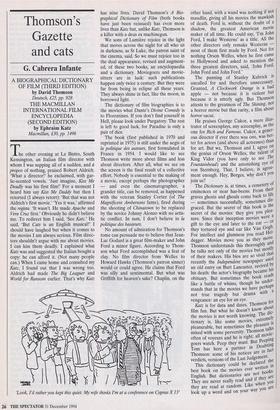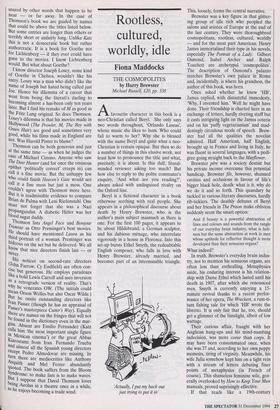Thomson's Gazette and cats
G. Cabrera Infante
The other evening at Le Bistro, South Kensington, an Italian film director with whom I was supping all of a sudden, and a propos of nothing, praised Robert Aldrich. `What a director!' he exclaimed, with gar- lic-scented vowels. 'Just imagine, Kiss Me Deadly was his first film!' For a moment I heard him say Kiss Me Daddy but then I retorted (I always retort): 'But that was not Aldrich's first movie.' Yes it was,' affirmed the regista. 'It wasn't. He made Apache and Vera Cruz first.' Obviously he didn't believe me. To redirect him I said, 'See Katz.' He said, 'But Cats is an English musical!' I should have laughed but when it comes to the movies I am always serious. Film direc- tors shouldn't argue with me about movies. I can kiss them deadly. I explained what Katz was and suggested the Italian bought a copy: he can afford it. (Not many people can.) When I came home and consulted my Katz, I found out that I was wrong too. Aldrich had made The Big Leaguer and World for Ransom earlier. That's why Katz has nine lives. David Thomson's A Bio- graphical Dictionary of Film (both books have just been reissued) has even more lives than Katz but, unlike Katz, Thomson is a killer with a deus ex machinegun.
We sons of Lumiere rejoice in the light that moves across the night for all who sit in darkness, as St Luke, the patron saint of the cinema, said. So we must rejoice too in the dual appearance, revised and augment- ed, of these two books, an encyclopaedia and a dictionary. Moviegoers and movie- sitters are in luck: such publications happen only twice a century. But they were far from being in eclipse all these years. They always shine in fact, like the moon, in borrowed light.
The dictionary of film biographies is to the movies what Dante's Divine Comedy is to Florentines. If you don't find yourself in Hell, please look under Purgatory. The rest is left to good luck, for Paradise is only a pair of dice.
The book (first published in 1970 and reprinted in 1975) is still under the aegis of la politique des auteurs, first formulated in France in 1954. I would like to see Thomson write more about films and less about directors. After all, what we see on the screen is the final result of a collective effort. Nobody is essential to the making of a movie, except perhaps the photographer — and even the cinematographer, a grander title, can be removed, as happened with the veteran Stanley Cortez (of The Magnificent Ambersons fame), fired during the shooting of Chinatown to be replaced by the novice Johnny Alonzo with no artis- tic conflict. In sum, I don't believe in la politique des hauteurs.
No amount of admiration for Thomson's tome can persuade me to believe that Jean- Luc Godard is a great film-maker and John Ford a minor figure. According to Thom- son what Ford accomplished was a feat of clay. No film director from Welles to Howard Hawks (Thomson's patron sinner) would or could agree. He claims that Ford was silly and sentimental. But what was Griffith for heaven's sake? Chaplin, on the `Look I'd rather you kept this quiet. My wife thinks I'm at a conference on Cygnus X 13' other hand, with a wand was nothing if not maudlin, giving all his movies the mawkish of death. Ford is, without the doubt of a shadow, the greatest American movie maker of all time. He could say, 'I'm John Ford, I make Westerns' as a title. All the other directors only remake Westerns — most of them first made by Ford. Not for nothing Orson Welles, when he first came to Hollywood and asked to mention the three greatest directors, said, 'John Ford, John Ford and John Ford.'
The panning of Stanley Kubrick is uncalled for and therefore unnecessary. Granted, A Clockwork Orange is a bad apple — not because it is violent but because it is utterly ugly. But Thomson attests to the greatness of The Shining, not a horror movie but that rarity, a film about horror vacui.
He praises George Cukor, a mere illus- trator of screenplays, any screenplay, as the one for Rich and Famous. Cukor, a gener- ous director if ever there was one, was bet- ter for actors (and above all actresses) than for art. But we, Thomson and I, agree on the genius of Orson Welles, the talent of King Vidor (you have only to see The Fountainhead) and the astonishing eye of von Sternberg. That, I believe, is agree- ment enough. Hey, Borges, why don't you join us? The Dictionary is, at times, a cemetery Of eminences or near has-beens. From their graves ghosts and ghouls come back to life — sometimes successfully, sometimes dis- graced. But the secret of this book is the secret of the movies: they give you plea- sure. Since their inception movies were a gift to the eye and later to the ear — or they tortured eye and ear like Van Gogh- For intellect and glumness you read Hel- degger. Movies move you as they move. Thomson understands this thoroughly and he talks not only of the movies but mostly of their makers. His bios are so vivid that recently the Independent newspaper used an old entry on Burt Lancaster, revived by his death: the actor's biography became his obituary. But sometimes the book reads like a battle of whims, though he under- stands that in the movies we have perhaps not true tragedy but drama with a vengeance: an eye for an eye. Katz is for data and dates, Thomson for film fun. But what he doesn't know about the movies is not worth knowing. The dic tionary is, like some movies, extremely pleasurable, but sometimes the pleasure mixed with some perversity. Thomson taik.. often of voyeurs and he is right: all movie goers watch. Peep they must. But Peep"rig Tom has here a partner in Doubting Thomson: some of his notices are in fact verdicts, versions of the Last Judgement. This dictionary could be declared the . best book on the movies ever written 111 English. But dictionaries are not books. They are never really read and if they are l they are read at random. Like when you ou look up a word and on your way y snared by other words that happen to be near — or far away. In the case of Thomson's book we are guided by names that could be above the titles listed below. But some entries are longer than others or terribly short or unfairly long. Unlike Katz this is not a democratic book but rather authorcratic. It is a book for Goethe not for Lichtenberg — if they ever could have gone to the movies. I know Lichtenberg would. But what about Goethe?
I know director Joseph Losey, some kind of Goethe in Chelsea, wouldn't like his entry. Losey was a man who didn't like the name of Joseph but hated being called just Joe. Hence his dilemma of a career that went from being the literati's darling to becoming almost a has-been only ten years later. But I find his remake of M as good as the Fritz Lang original. So does Thomson. Losey's dilemma is that his movies made in Hollywood (The Prowler, M, The Boy with Green Hair) are good and sometimes very good, while his films made in England are not. Was Harold Pinter to blame?
Thomson can be both generous and just at the same time — as when he judges the case of Michael Cimino. Anyone who saw The Deer Hunter (and for once the ominous epithet 'politically correct' creeps in) can call it a fine movie. But the unhappy few who could finish Heaven's Gate would not call it a fine mess but just a mess. One couldn't agree with Thomson more here. But it is inadmissible evidence to compare Brian de Palma with Leni Riefenstahl. One must not forget that she was a Nazi ProPangandist. A diabetic Hitler was her blood sugar daddy. Thomson lists Angel Face and Bonjour Tnstesse as Otto Preminger's best movies. He should have mentioned Laura as his third portrait of a woman, Preminger was hideous on the set but he delivered. We all know that nice directors finish last — or never.
His notices on second-rate directors (John Farrow, Cy Endfield) are often con- cise but generous. He employs paradoxes like a bold Lewis Carroll and uses inversion as a retrograde version of reality. That's Why he venerates OW. (The initials could mean Orson Welles but also Oscar Wilde.) But he omits outstanding directors like Ivan Passer (though he has an appraisal of Passer's masterpiece Cutter's Way). Equally there are names on the fringes that will not be found in the dictionary even in the mar- gins. Absent are Emilio Fernandez (Katz Falls him 'the most important single figure in. Mexican cinema') or the great Abbas ICIarostami from Iran. Fernando Trueba and almost all the Spanish young directors except Pedro Almodovar are missing. In turn there are mediocrities like Anthony Asquith and Mel Ferrer abundantly quoted. The book suffers from the Bloom Syndrome: to make lists is to make waves. But I suppose that David Thomson loves being Aeolus in a theatre once in a while, as he enjoys becoming a trade wind.



























































 Previous page
Previous page